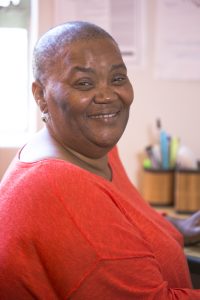 Tuksie Nkwinti has taught for over twenty years. A former principal of LEAP, she now co-manages the Champion Teachers Program which serves in-service teachers from Limpopo and East London.
Tuksie Nkwinti has taught for over twenty years. A former principal of LEAP, she now co-manages the Champion Teachers Program which serves in-service teachers from Limpopo and East London.
Tell us about your upbringing and how you entered the teaching profession.
I was born in Salem, which is the farm between Port Elizabeth and Grahamstown. My family migrated to Port Elizabeth, and I left with my mother who was employed as a domestic servant. That’s where I did my elementary schooling. Later, I went to the Cape College of Education to get my teaching certificate. I come from an uneducated family, so there was excitement that I was the first in the family to go to college and the first in the family to be able to have a profession.
How did your work with the Champion Teachers Program start?
A few years ago, I realized I had held many different positions in education, but the one thing I hadn’t done was help teachers from disadvantaged areas by sharing my experiences. So I helped start the Champion Teachers Program in 2013 by working with twenty-four teachers from Limpopo and East London.
How could you relate to the teachers in the program?
Through the program, I met teachers who felt voiceless in the education system. They felt trapped into hierarchical structures at their schools that didn’t allow them to collaborate with others or share their own struggles. Even more, they had little access to resources that could help their practice.
I could put myself in the shoes of these teachers because like them, I was once a teacher in a township that didn’t know many different kind of teaching strategies or pedagogies, and didn’t have any support. Like them, I often felt inferior as a teacher and always tried to hide certain aspects of myself.
What do you think teachers are missing in their training experience?
The difficulty that we have in education-that I think is killing us- is that we are unable to share with each other. Through my experiences teaching in township schools, people rarely wanted to talk about their professional or personal struggles. They would rather hide in their own office spaces and classrooms instead of confronting their challenges.
But you cannot stand in front of the classroom and teach when you don’t understand yourself. Teaching must start with understanding your identity, your emotions, your weaknesses and your challenges. If we can understand these things, then it’s going to be easy to actually take that understanding and use it positively when you enter a classroom. I think that’s the missing concept.
What makes the Champion Teachers Program unique?
Our programs have created a space here where teachers are able to talk about these things. Other teachers may be very qualified, and very knowledgeable about their subject. But through these programs, I am seeing teachers for the first time owning their experiences and accepting what needs to change to make their practice better.
I take pride in seeing teachers who never before had a voice now feeling empowered to speak. I take pride in seeing teachers coming from different schools, different skills, different methodologies, different cultures all still sharing freely, and accepting critique not as judgment, but as a tool for growth. At the end of our sessions, teachers say they leave with a better understanding of themselves, their identity, and their culture. I hope all teachers in any corner of the world could gain that same understanding and then integrate it into their own classrooms.
So when we say ”Champion Teacher”, we’re not saying they are champions because they are perfect. They are champions because they are willing to learn, and then take back what they learned from us and share it in their schools.
What would you say to those who are skeptical that experienced teachers in South Africa can change so late in their profession?
People say that sometimes it’s difficult to learn when you are old. That’s a huge misconception. What matters is that our teachers allow themselves to both learn and unlearn. Teachers must be willing to be students themselves, so that they can then better facilitate learning for others.
I’ve taught for over twenty years, but there is no way I can be the same teacher I was first trained to be. I have to be willing to grow. I have to acknowledge what I don’t know and acknowledge that I have to learn more.
What do you see for the future of education in South Africa?
When Mandela was freed, people thought there would be change in South Africa. And that was a big lie. Because people were just excited that we were free, they got stuck in the freedom instead of transforming and changing themselves.
Now it’s up to us to make that change happen. We’re doing that at the GTI. We’re not waiting for the government to tell us how to change. We’re doing it ourselves.
By creating this program and reaching out to teachers that come from these isolated areas, we are forming a social movement of teachers who can learn new things together. If there is no collaboration within the system of education, we are going to stay stuck where we are.
